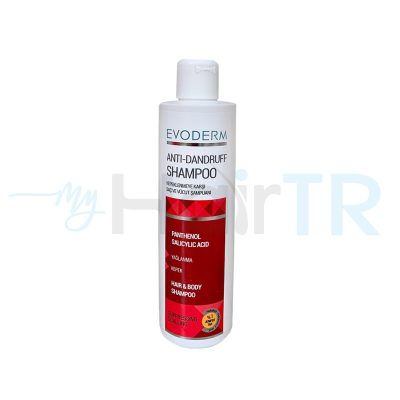Dandruff is a skin disease characterized by itching and flaking symptoms on the scalp, and it causes extreme discomfort in people who have dandruff problems, as white, oily scaly rashes accumulate on the hair and shoulders of the people. While it remains unclear what actually causes dandruff, many studies on the subject suggest a number of underlying causes, such as genetic and environmental factors. The signs and symptoms of dandruff include white powder-like flakes that accumulate on the scalp due to excessive shedding of dead skin on the scalp, skin irritation, and itching. While the severity of dandruff can vary according to the season, it is usually worse in autumn and winter due to dry air.
Although dandruff is not among the risky conditions in terms of health, it is known that it causes social problems such as lack of self-esteem and self-confidence and shame in society, as it is often mistakenly perceived as a symptom of lack of hygiene and inadequate hair care.
“In a study, it was observed that the self-confidence of male participants with dandruff problems was lower compared to the self-confidence of participants who stated that they had a healthy scalp.”
Additionally, the severity of the condition may be a sign of other skin diseases, such as seborrheic dermatitis, which is accompanied by other symptoms such as inflamed red skin and yellowish scaly patches. For this reason, it is strongly recommended that people with such symptoms consult a dermatologist for medical advice and information about applicable treatment options such as anti-dandruff shampoos.
Evoderm Anti Dandruff Shampoo is very effective in preventing dandruff

How to Identify Dandruff in Hair?
Before choosing any dandruff shampoo or home remedy, it is very important to determine what the problem is, as the ingredients of the products or home remedies you apply to your scalp can irritate your skin more and even exacerbate the inflammation if your problem is a sign of another disease.
Conceptually, dandruff is defined as a lumpy, oily, and non-inflammatory abnormal desquamation of the scalp (scaly flaking or peeling) with skin itching, numbness, and tingling. Although the urge to scratch the itchy spot may provide short-term relief as the itching sensation is indeed uncomfortable, since the itching itself is caused by irritation, it causes a vicious cycle in which scratching the scalp causes more irritation.
Although medicated shampoos are often used in the treatment of dandruff to get rid of excess dead scalp cells accumulated in the hair, itching, and flaking of the scalp are also observed in skin problems such as seborrheic dermatitis, psoriasis on the scalp, or dryness of the scalp, each of which is caused by different reasons and requires different treatments. It is important to distinguish dandruff from these other problems and choose an appropriate treatment among medically examined methods.
What are the symptoms of dandruff?
Seborrheic Dermatitis
Psoriasis on the Scalp
Large, yellow, or white oily flakes
Itching on the scalp
Oily flaky skin
It is associated with the surface of the stratum corneum (the top layer of the epidermis, which is the outermost layer of the skin) expelling dead cells in excessive amounts.
Temporary Hair Loss
A chronic inflammatory disease
Erythematous (skin redness) patches with large, oily or dry flakes
Visible irritation
Inflammation
It affects 1-3% of the general adult population
Immune-mediated inflammatory diseases (IMID)
Itchy, flaky red scalp
Inflamed silver-colored red lesions that are slightly raised from the skin
Large, thick red and brown patches called plaques covered with silvery scales
Associated with the overproduction of skin cells that form plaques
What Causes Dandruff?
As mentioned above, while the leading causes are not known for sure, dandruff occurs when the scalp sheds dead skin as large oily flakes instead of the usual, invisible minor rashes during the skin’s renewal. For this reason, it is assumed that the formation of dandruff may be related to some genetic factors, such as the sebaceous glands secreting excessive amounts of sebum (oil on the skin). This has also been linked to the fact that dandruff occurs mainly during adolescence and middle age when the sebaceous glands are most active. Similarly, higher sebum levels in men compared to women may explain why men experience dandruff more often than women.
At the same time, some diseases that affect the nervous system, such as Parkinson’s Disease, or microorganisms and fungal infections such as Malassezia globosa, a fungus that lives only on the scalp, are among the other causes of dandruff. Studies also show that there is a strong correlation between the increase in the severity of dandruff and the dry air of autumn and winter months and people’s stress levels.
Myths and Truths About Dandruff
Dandruff is caused by a lack of hygiene.
No, dandruff is not caused by a lack of hygiene, but not washing your hair enough can cause dead skin cells to accumulate and become visible in your hair.
Dandruff is contagious.
No, dandruff is not contagious, so it is not possible for someone else to pass it on or infect you with someone else’s dandruff.
Dandruff causes hair loss.
No, dandruff does not cause hair loss, but scratching caused by the itching sensation can damage the hair follicles, which can cause thinning hair or temporary hair loss, although not baldness. However, it should be noted that dandruff may cause faster hair loss in people with androgenetic alopecia, a type of hair loss observed in both men and women. However, if you are experiencing significant patchy hair loss, this may also be due to alopecia areata (ringworm). It is highly recommended to consult a dermatologist.
What is the Ultimate Solution Against Dandruff?
As mentioned before, it is very important to find out what the skin problem you are experiencing is before any treatment. Anti-dandruff shampoos containing fungicides such as ketoconazole selenium sulfide and salicylic acid are used to combat dandruff. Additionally, applying aspirin or oils such as coconut oil tea tree oil, or coal tar to your hair due to its salicylic acid content is among the home remedies for dandruff and hair-related problems. Avoiding harsh chemicals that can irritate the skin, not harshly plucking patches or plaques on the scalp, and combing your hair more frequently to prevent the accumulation of flakes are also recommended as solutions against dandruff. Finally, it is strongly recommended that you undergo a scalp examination to diagnose your problem and follow a treatment accordingly.


 Deutsch
Deutsch Español
Español Nederlands
Nederlands Italiano
Italiano